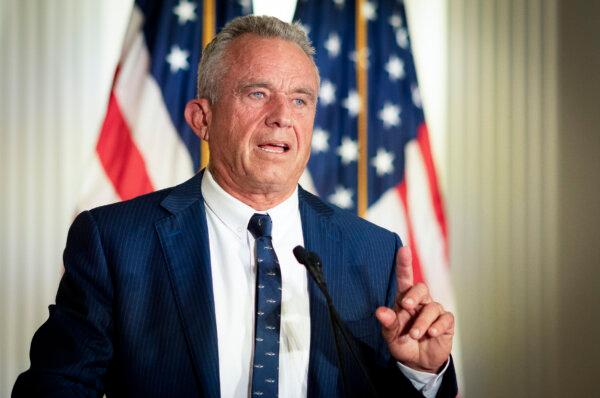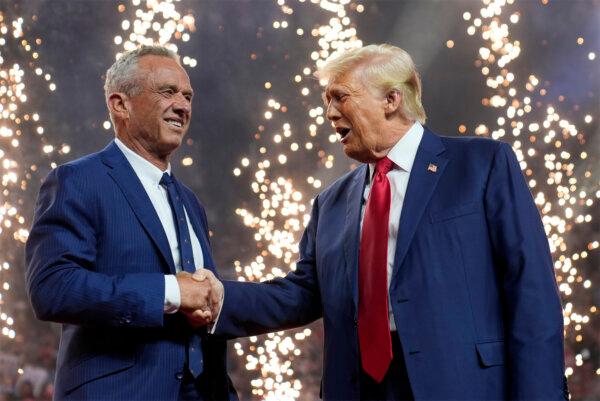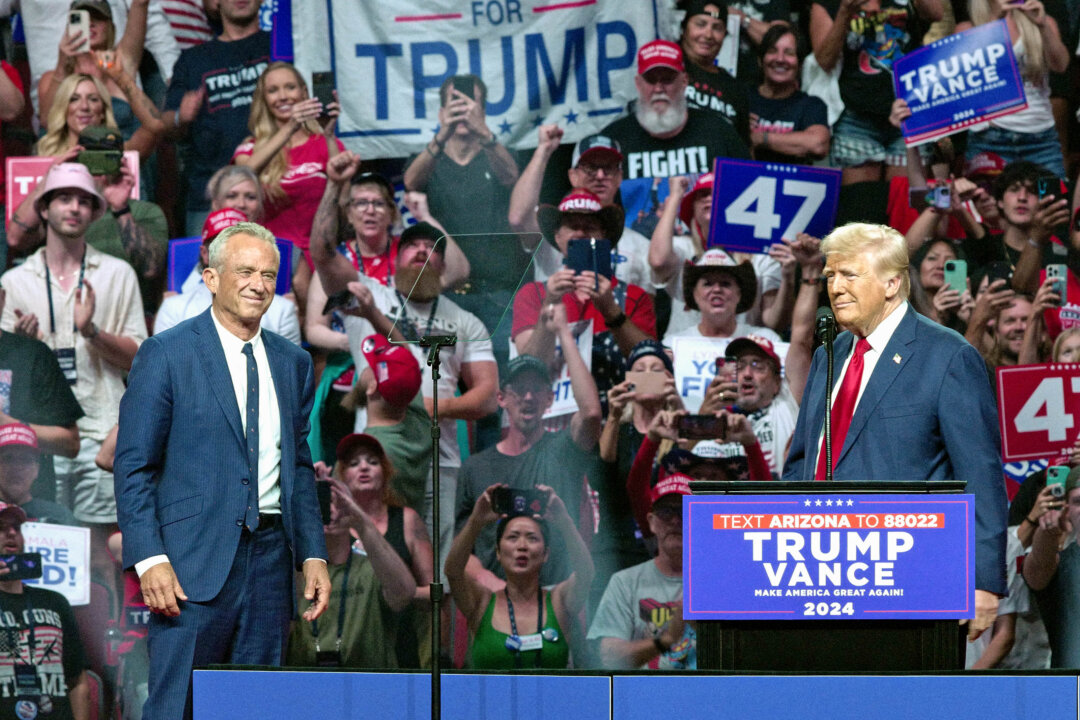Opinions vary on whether Kennedy suspending his campaign in select states will benefit the former president, help Harris, or have minimal impact.
In a presidential race that could be decided by a slim margin in a handful of swing states, the campaigns and supporters of former President Donald Trump and Vice President Kamala Harris are battling to secure every possible advantage, with Election Day a little more than two months away.
Robert F. Kennedy Jr., who suspended his independent presidential bid in 10 battleground states and urged his supporters in those states to vote for Trump, could still appear on the ballot in as many as 40 states and the District of Columbia.
He told The Epoch Times on Aug. 26 that he believes his decision will influence the outcome on Nov. 5 and lead to Trump defeating Harris.
In a speech on Aug. 23, Kennedy said he was withdrawing his name from ballots in battleground states “where [his] presence would be a spoiler.”
Kennedy also noted that his name would remain on ballots in the rest of the states, where voters could pick him over Trump and Harris.
“If you live in a blue state, you can vote for me without harming or helping President Trump or Vice President Harris. In red states, the same will apply,” he said.
Over the course of Kennedy’s campaign, a majority of attendees at his campaign events interviewed by The Epoch Times said they voted for Trump in 2020.
Kennedy told The Epoch Times on Aug. 26 that his campaign’s polling indicated that if he left the race in the swing states, 57 percent of those voters would cast their ballot for Trump. If he stayed in the race, it would result in a likely Harris victory, he added.
Professional polling and Trump’s internal polling have shown that voters who are not backing either major candidate, including Kennedy’s supporters, currently favor Trump in the seven most crucial swing-states: Arizona, Georgia, Michigan, North Carolina, Nevada, Pennsylvania, and Wisconsin.
As of Aug. 26, Harris leads Trump, 47.1 percent to 43.7 percent, according to FiveThirtyEight’s average of polls.
A Pew Research study conducted in early July and early August indicated that Kennedy supporters were “far less likely to say they were highly motivated to vote in the presidential election.”
In August, 72 percent of Trump supporters and 70 percent of Harris supporters reported being “extremely motivated” to vote, while only 23 percent of RFK Jr.’s backers felt the same, according to the research.
Pew Research’s nationwide surveys show that following President Joe Biden’s decision to leave the race and endorse Harris, 39 percent of Kennedy’s supporters continued to support Kennedy. Of those who changed their preference, 39 percent shifted to Harris and 20 percent to Trump.

David Carlucci, a former New York state senator who is now a Democratic political strategist, told The Epoch Times that the Pew Research analysis shows there is a lack of enthusiasm for Kennedy and that “his supporters are less likely to significantly influence the outcome in battleground states, making their overall impact negligible.”
The analysis also found that “most Kennedy supporters did not identify as partisans, and a majority held unfavorable views of both Harris and Trump.”
Only 14 percent of Kennedy’s backers in the study considered themselves Republicans, while 12 percent identified as Democrats.
Wes Farno, an Ohio-based Republican strategist, said that enough Kennedy supporters will vote for Trump to have an impact on the election. He estimates that Trump will now receive 3 percent to 4 percent more support in the battleground states.
He told The Epoch Times that Kennedy’s endorsement of Trump “is not just a political event, but a significant marker of a shift in the American political landscape.”
“It highlights a growing trend: people are seeking answers to pressing policy questions. Whether it’s about COVID-19 being a government experiment gone wrong, the possibility of CIA involvement in the Kennedy assassinations, the situation in Ukraine, or concerns about the safety of our food, Americans are increasingly questioning the narratives they’ve been given,” Farno said.
Trump is reaping the benefits of Kennedy’s willingness to “ask the tough questions,” Farno said.
Kennedy launched his White House bid in April 2023 with the intent to compete with Biden for the Democratic Party nomination. In October, he announced that he would run as an independent, citing roadblocks from the Democratic National Committee and claiming they were “rigging” the primary contest so that no candidate could compete effectively against Biden.
During his Aug. 23 address, Kennedy criticized the Democrats for aligning with Biden and then nominating Harris without a primary. He also chastised the DNC for backing lawsuits in multiple states aimed at blocking him from the ballot.
‘Legacy’ of a Healthy America
Kennedy told The Epoch Times on Aug. 26 that Trump will make a series of announcements that other Democrats are joining his campaign.
Kennedy said he will actively campaign for Trump from this point forward, and that there is no defined role he would have in a Trump administration. However, he told Tucker Carlson that Trump has asked him to serve on the transition team “to help pick the people who will be running the government.”
Fighting chronic disease, improving children’s health, and addressing corporate capture of government agencies are his passions, but he said there is no agreement in place for a set role.
Kennedy said that Trump “[wants] to leave as his legacy healthy children.” “That is a deep interest we share,” he said.
With Kennedy onstage at a rally in Glendale, Arizona, on Aug. 23, Trump announced that should he be reelected, he would appoint Kennedy to a panel investigating the rise in chronic disease in children.
Trump specifically said he would “establish a panel of top experts working with Bobby [Kennedy] to investigate what is causing the decades-long increase in chronic health problems and childhood diseases, including autoimmune disorders, autism, obesity, infertility, and many more.”
During his Aug. 23 address, Kennedy said: “If I’m given the chance to fix the chronic disease crisis and reform our food production, I promise that within two years, we will watch the chronic disease burden lift dramatically.
“Suspending my candidacy is a heartrending decision for me. But I am convinced that it is the best hope for ending the Ukraine war and ending the chronic disease epidemic that is eroding our nation’s vitality from the inside and for protecting free speech. I feel a moral obligation to use this opportunity to save millions of American children.”
On Aug. 26, he told The Epoch Times that he believed that joining forces with Trump would allow him to accomplish those objectives, and that is one factor that inspired him to join Trump in a “unity” ticket.
Democratic Party officials dismissed Kennedy’s contention that his backing of Trump will shape the outcome of the election.
“Donald Trump isn’t earning an endorsement that’s going to help build support, he’s inheriting the baggage of a failed fringe candidate,” DNC senior adviser Mary Beth Cahill said in a statement. “Good riddance.”
After learning that Kennedy would suspend his campaign in select states, the Harris campaign courted his supporters.
“For any American out there who is tired of Donald Trump and looking for a new way forward, ours is a campaign for you,” Campaign Chair Jen O’Malley Dillon said in a statement.
“Even if we do not agree on every issue, Kamala Harris knows there is more that unites us than divides us: respect for our rights, public safety, protecting our freedoms, and opportunity for all.”

‘Rescuing the Union’
Lauren Lee is a political theorist and podcaster who lives in Virginia. She pointed out that though Kennedy is supporting Trump in the 10 battleground states, voters still have a reason to cast their ballot for him.
Kennedy’s campaign submitted paperwork to create the We The People political party in January. The campaign said that in certain states, filing for political party status reduced the number of signatures required for the candidate to gain ballot access.
Lee is a Kennedy supporter who told The Epoch Times she would remain committed to growing the We The People party and helping Kennedy get 5 percent of the vote, a threshold for minor parties to get federal funding.
“Many outlets and people in the media and on social media are claiming that Kennedy dropped out of the race and endorsed Trump,” she told The Epoch Times.
“In reality, he just announced a ‘unity party’ with Donald Trump, like when Abraham Lincoln and Andrew Johnson ran for the country instead of against each other, intending to rescue the Union, in 1860.”Gaining at least 5 percent of the national vote will “establish a strong third party, earn eight figures in publicly available funds, and enter 2028 with a strong enough foundation to be a real contender,” Lee said.
The unity party arrangement allows Republicans in deep blue states to cast a vote for Kennedy and participate in “the long-term strategy of ending the two-party stronghold,” she said.
There is still a scenario, Lee pointed out, where Kennedy voters can “turn out in droves” in the non-battleground states and force a contingent election if he wins five states. That would prevent Harris and Trump from reaching 270 Electoral College votes, and the election would be decided by the U.S. House.
Richard Winger, editor of Ballot Access News, confirmed to The Epoch Times that an independent who gains 5 percent or more of the vote receives federal funding. In this election, doing so could establish We The People as a certified minor party.
Winger told The Epoch Times that Kennedy’s Aug. 23 decision could keep the candidate from accumulating 5 percent.
“I don’t think Kennedy will get that much support. People will think, ‘He’s not really running, so why should I vote for him?’” Winger said.
“Most people want to vote for somebody that they think is trying to win. I don’t think he’s giving the impression that he’s trying to win. He’s trying to help Trump, so I think that’s going to shrink his voter turnout by a lot.”
Lee is hopeful that Winger is proven wrong.
“Even if he doesn’t win a state and gets 5 percent of the national vote, that will ensure a robust third-party future for the United States,” Lee told The Epoch Times.
“Kennedy presented an opportunity to vote based on hope and not just out of fear of the other guy. I hope that we do get that 5 percent so that in the future, citizens will be able to vote truly out of hope and not just because they want the other guy to lose.”

